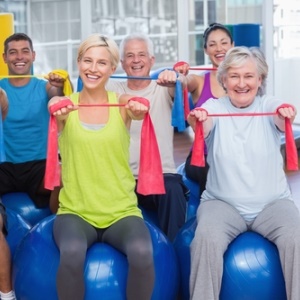
People who have better aerobic fitness in middle age may ward off decreases in brain volume later in life, potentially preserving memory and other functions, a U.S. study suggests.
"The current findings suggest that maintaining high fitness in midlife may boost brain health on average 20 years later in adults who have not yet experienced cognitive impairment," lead study author Qu Tian, a gerontology researcher at the U.S. National Institute on Aging, said by email.
How the study was done
Tian and colleagues followed 146 older adults over a decade, using treadmill tests to measure what's known as cardiorespiratory fitness, or how well the heart and lungs deliver oxygen to the body. They also used magnetic resonance imaging (MRI) to detect changes in brain volume.
At the start of the study in 1994, participants were 69 years old on average. To be included, they had to be healthy and free of cognitive impairment, dementia, Parkinson's disease or other neurological problems and have no history of stroke, heart or lung disease, or cancer.
In the treadmill tests at the start of the study, researchers used mathematical models to estimate participants' fitness levels when they were age 50.
People who were fitter at 50 had greater brain volume later in life in the middle temporal gyrus, believed to be involved in functions like memory, language and visual perception, as well as in the perirhinal cortex, thought to aid unconscious memory and object recognition. They also had a greater volume of white matter; when this declines, it may be an early symptom of Alzheimer's disease.
Slower shrinking of two parts of the cerebral cortex region of the brain, the middle frontal and angular gyri, may predict better cardiorespiratory fitness in advanced old age, the researchers report in the Journals of Gerontology.
The findings add to a growing body of evidence linking physical exercise to higher volumes in certain areas of the brain, but because long-term studies like this tend to attract healthier and better-educated people, it's hard to say whether the results would be similar for a broader population, said Sandra Bond Chapman, founder and director of the Center for BrainHealth at the University of Texas at Dallas, who wasn't involved in the study.
Moreover, not all people achieve the same gains in cardiorespiratory fitness from the same amount of exercise, and scientists aren't sure how cardiorespiratory fitness relates to cognitive function, Chapman said by email.
It's also hard to distinguish between cause and effect in the study, said Dr. Jeff Burns, director of the Alzheimer and Memory Clinic at the University of Kansas Medical Center in Kansas City.
"A challenging question that is hard to get to the root of is whether exercise makes us smarter or do smarter people tend to exercise more than others," Burns, who wasn't involved in the study, said by email.
Scientists do know cardiorespiratory fitness is improved by aerobic activities like walking, dancing and jogging, said Scott Hayes, Associate Director of the Neuroimaging Research for Veterans Center at the VA Boston Healthcare System.
Hayes, who wasn't involved in the new research, told Reuters Health by email that while the current study focused on how cardiorespiratory fitness can improve brain volume, previous research has linked this type of fitness to improved memory for names or specific events, as well as planning and the ability to switch between tasks.
More research is still needed in larger groups of people to better understand the effect of cardiorespiratory fitness on the brain, said Kirk Erickson in an email to Reuters Health. Erickson, a researcher at the Brain Aging & Cognitive Health Lab at the University of Pittsburgh, also wasn't involved in the current project.
"Nonetheless," Erickson said, "this study adds to a field that has been repeatedly showing positive associations and effects of physical activity and fitness on brain health in late adulthood."
Read more:
Genes determine which exercise is best
Source: Journals of Gerontology Series A




 Publications
Publications
 Partners
Partners










